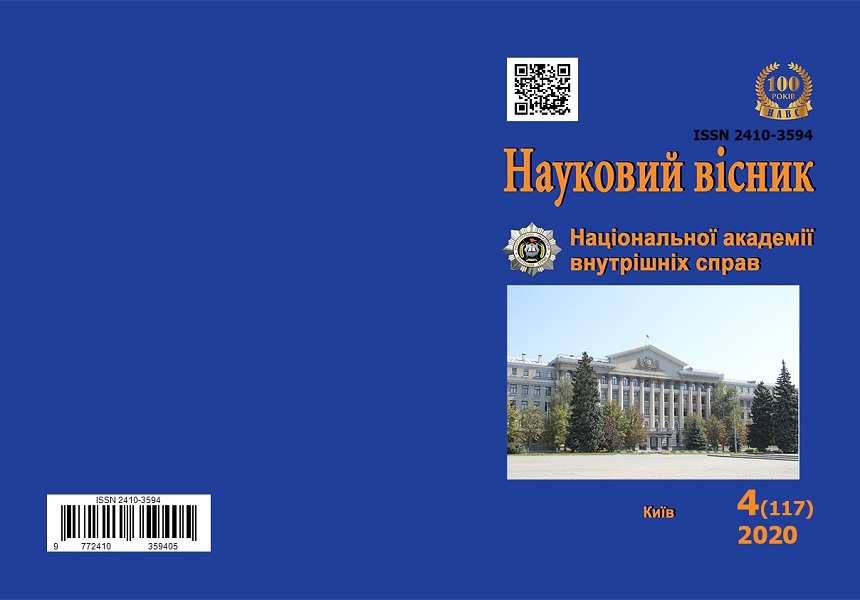Mechanisms for Exempting Corporations from Criminal Liability for Antitrust Violations: Comparative Legal Aspect
Abstract
The purpose of the publication is to critically study the American law enforcement experience in terms of exempting corporations from criminal liability for violating US antitrust laws and to formulate relevant conclusions aimed at improving the domestic model of criminal law measures against legal entities. Methodology. The article uses the following scientific in an integrated mode: terminological, system-structural, formal-logical, comparative-legal. Scientific novelty. According to the results of a comparative analysis of the mechanisms of exemption of legal entities (corporations) from criminal liability for their violations of national antitrust law in the United States, it is determined that such grounds (conditionally effective remorse by a legal entity) are not provided in domestic criminal law; the author’s position is expressed that during the draft law work on section XIV-1 of the Criminal Code it is necessary to critically use the experience of the USA in the researched field. Conclusions. Section XIV-1 «Measures of a criminal nature of legal entities» of the General Part of the Criminal Code of Ukraine does not address the issue of encouraging positive post-criminal behavior of legal entities. Only Art. 96-5 «Grounds for exemption of a legal entity from the application of measures of a criminal nature» of the mentioned section addresses such grounds for exemption as the expiration of the statute of limitations for the application of measures of a criminal nature to a legal entity. At the same time, it is difficult to call this norm perfect because of its individual shortcomings and a certain «isolation» of legislative regulation. During the draft law work on the formal and substantive improvement of Section XIV-1 of the Criminal Code of Ukraine, certain elements of American practice should be more carefully elaborated and used in terms of the application of alternative mechanisms to criminal prosecution of organizations.
Keywords: economic crime; corporation; criminal liability; antitrust compliance; competition; abuse of position; procedural agreement.
Downloads
References
Arlen J., Kahan M. Corporate Governance Regulation Through Non-prosecution. University of Chicago Law Review. 2017. No. 84. P. 320–335.
Конкурентне право України : навч. посіб. / [О. О. Бакалінська, О. В. Безух, О. В. Кологойда та ін.] ; за ред. В. С. Щербини, І. В. Лукач. Київ : Ліра-К, 2017. 380 c.
Commission Notice on Immunity from fines and reduction of fines in cartel cases. 2006. URL: http://eur-lex.europa.eu/legal-content/EN/ALL/?uri=CELEX:52006XC1208(04).
Corporate Leniency Policy. 1993. URL: https://www.justice.gov/atr/corporate-leniency-policy.
Council Regulation (EC) No. 1/2003 of 16 December 2002 on the implementation of the rules on competition laid down in Articles 81 and 82 of the Treaty. URL: http://eur-lex.europa.eu/legal-content/EN/ALL/?uri=celex:32003R0001.
Hammond S. The Evolution of Criminal Antitrust Enforcement over the Last Two Decades. The 24th Annual National Institute on White Collar Crime. Miami, Fl. February 25, 2010. P. 4.
Kamensky D., Dudorov O., Movchan R., Voznyuk A., Makarenko T. Insider trading in the global economic environment: elements of criminal liability. International Journal of Management. 2020 Vol. 11. Issue 12. P. 1679–1688. doi: https://doi.org/10.34218/IJM.11.12.2020.154.
Каменський Д. У розвиток дискусії про вдосконалення механізму кримінально-правової охорони національної економіки в умовах глобалізації. Юридичний вісник. 2020. № 5. С. 105–113. doi: https://doi.org/10.32837/yuv.v0i5.2008.
Каменський Д. В. Методологічні особливості порівняльних кримінально-правових досліджень: здобутки української та американської доктрини. Науковий вісник Міжнародного гуманітарного університету. 2020. № 44. С. 108–112. doi: https://doi.org/10.32841/2307-1745.2020.44.23.
Клепицкий И. А. Опасные реформы: наказания и освобождение от ответственности за картели. Закон. 2018. № 4. C. 92–108.
Лук’янченко С. Зарубіжний досвід застосування кримінальної відповідальності для юридичних осіб. Підприємництво, господарство і право. 2019. № 11. С. 302–306. doi: https://doi.org/10.32849/2663-5313/2019.11.51.
Провоторов О. П. Заходи кримінально-правового характеру щодо юридичних осіб як одна з моделей реалізації інституту кримінальної відповідальності: міжнародний досвід. Наукові записки Львівського університету бізнесу та права. 2018. Вип. 19. С. 232–239. doi: http://doi.org/10.5281/zenodo.2631535.
Snyder B. Compliance is a Culture, Not Just a Policy. International Chamber of Commerce. United States Council of International Business Joint Antitrust Compliance Workshop. New York, NY. September 9, 2014. URL: https://www.justice.gov/atr/file/517796/download.
Abstract views: 91 PDF Downloads: 97
- Authors reserve the right to authorship of their own work and transfer to the magazine the right of the first publication of this work under the terms of the Creative Commons Attribution License, which allows other persons to freely distribute published work with mandatory reference to authors of the original work and the first publication of an article in this magazine.
- Authors have the right to enter into separate additional agreements on non-exclusive dissemination of the work in the form in which it was published in the journal (for example, to post an article in the institution's repository or to publish as part of a monograph), provided that the link to the first publication of the work in this journal is maintained.
- The journal's policy allows and encourages the posting of articles by authors on the Internet (for example, in electronic storehouses of institutions or on personal websites), both before the submission of this manuscript to the editorial office and during its editorial processing, as this contributes to the creation of a productive scientific discussion and positively affects the efficiency and dynamics of citing the published work.




